
Become A Philanthropist
Unlock Several New Layers Of Income, Impact, and Influence By Channeling Your Time, Skills, Gifts, and Wealth Towards Humanitarian and Public Benefits Causes
We Help Entrepreneurs and Investors Unlock The Power of The Tax-Exempt And Public Benefit Structure
Philanthropy is an alternating operating system - not a loophole.
In 1889, Andrew Carnegie published the Gospel of Wealth in which he asserted that any funds that are in excess or surplus of one's personal needs should be treated as a trust fund that benefits society.
This concept was indoctrinated into the Tax Code in 1917, thanks to the relentless efforts of Senator Hollis, who persuaded Congress to pass the Charitable Tax Deduction (found in Schedule A today).
His argument was simple:
A pre-tax deduction would incentivize more donations, and ultimately, up to 100% of the donations would reach the intended charity versus only 5, 10%, or 15% reaching the intended charity if it were to go through the government bureaucratic process - collected through taxes.
For over 100 years, this framework has been the operating model for successful entrepreneurs and investors - and today - in it's most evolved manner, this framework can be utilized by anyone who is looking to have a deeper impact in the world, advance causes they care about, and gain generations worth of tax and estate preservation benefits for doing a part of the government's work.
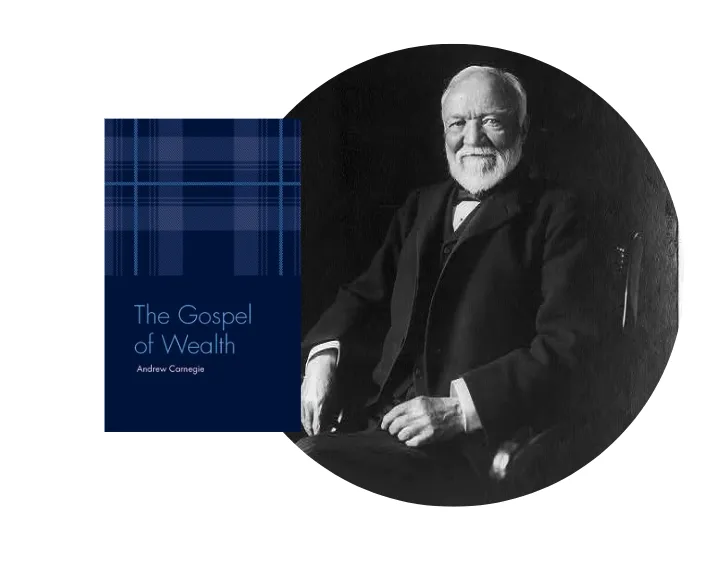

Strategic Philanthropy Is A Way Of Life, Not A Loophole.
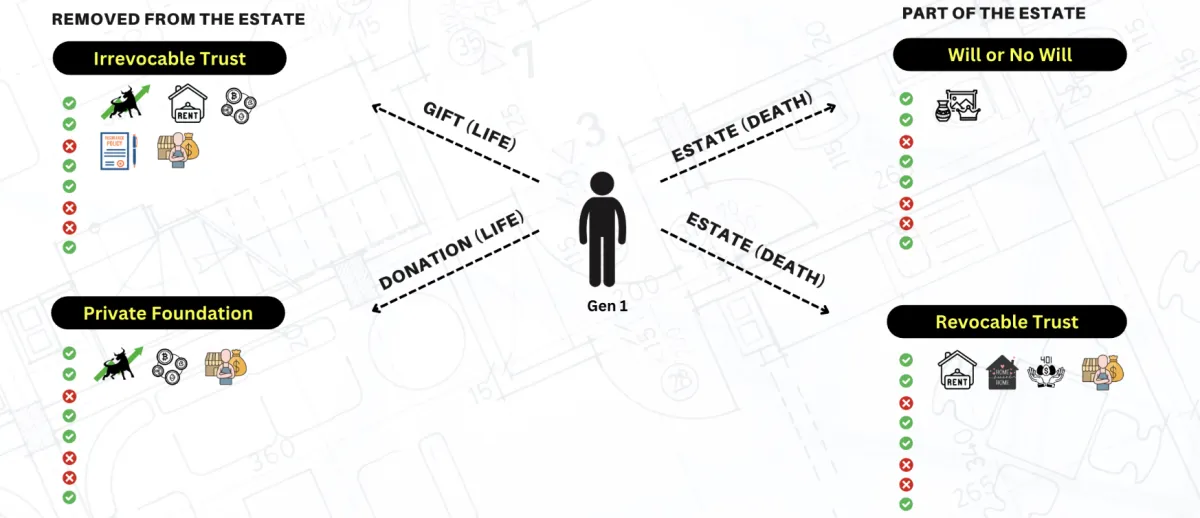
It's an operating model that aligns and connects:
business, personal, and philanthropic goals.
public, corporate, and private funding for aligned goals.
law, tax, finance, and philanthropic systems.
the gaps caused by mismatched business, estate, and tax goals.
governments, corporations, businesses, and individuals.
This is the operating formula deployed by the ultra wealthy and influential figures in society.
Members who believe their time, talent, and treasure can benefit their family and society at the same time.
Strategic philanthropy is formalized by incorporating nonprofits and foundations into the existing business, estate, and tax strategies - that's what the "traditional family office" model deployed by the wealthy.
This is our domain of expertise - the strategic and tactical fusion of different goals, entities, funding sources, professionals, and concepts to maximize your income, impact, and influence across several generations. Maximize the full potential of the tax code by redirecting your time, talent, and treasure to serve humanity.
Here are some examples:
Our institute facilitates the legal, tax, and financial architecture, strategy, and compliance.
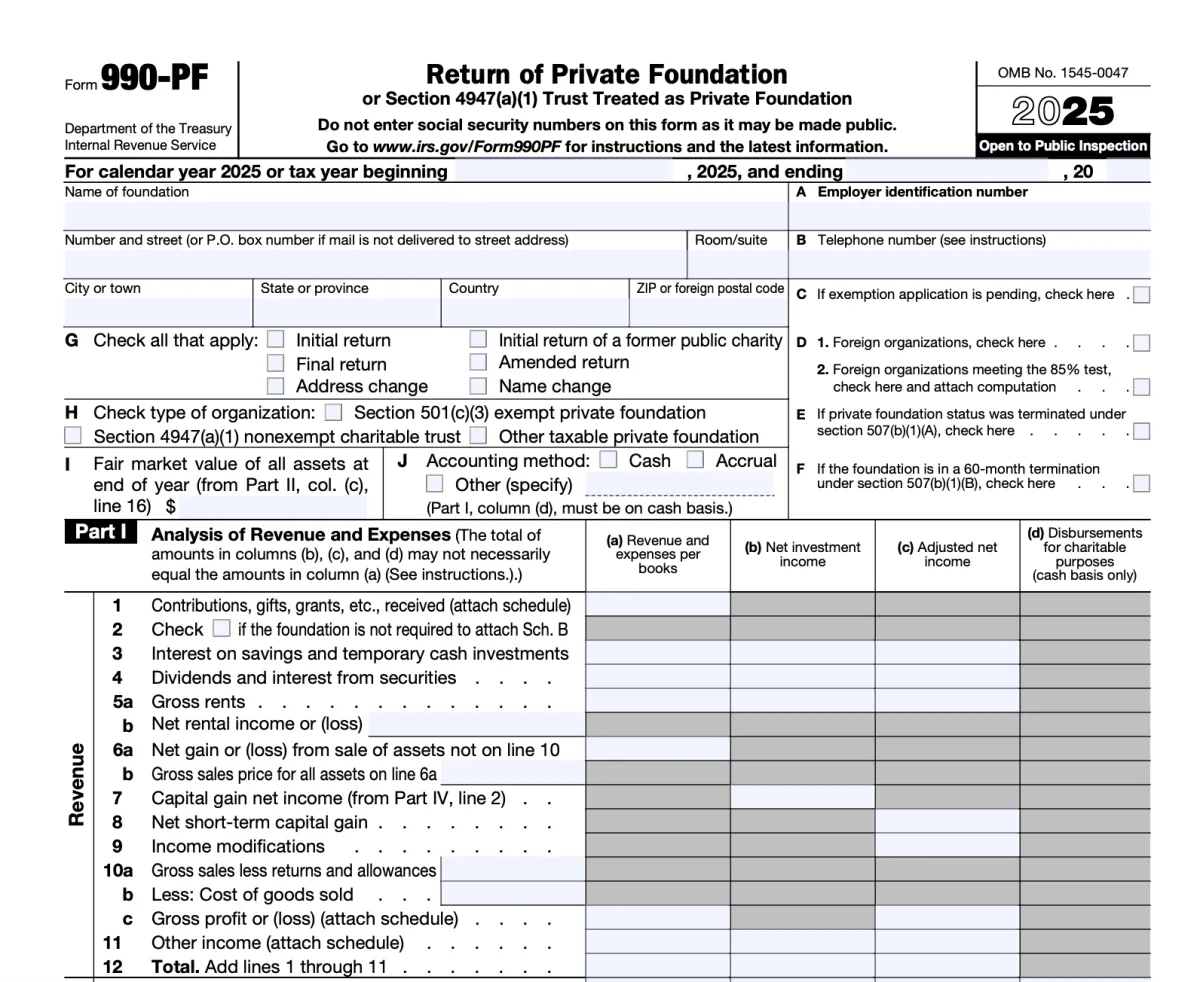
Examples of corporate, foundation, and government organizations fueling social causes.
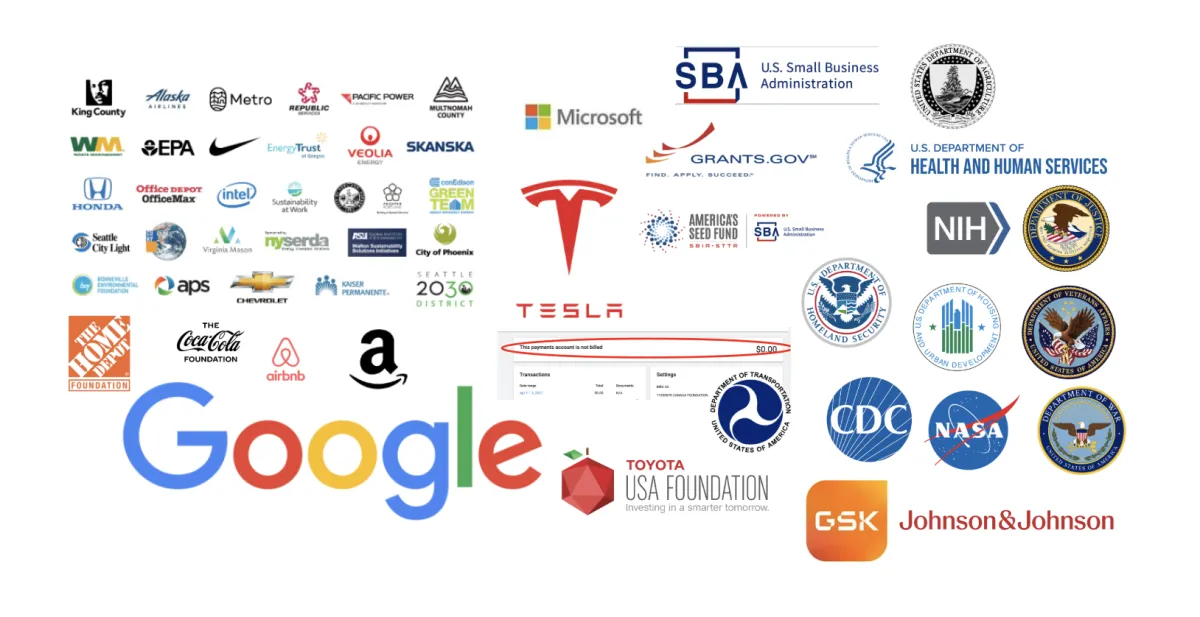
Examples of nonprofits and foundations deployed across 100s of industries
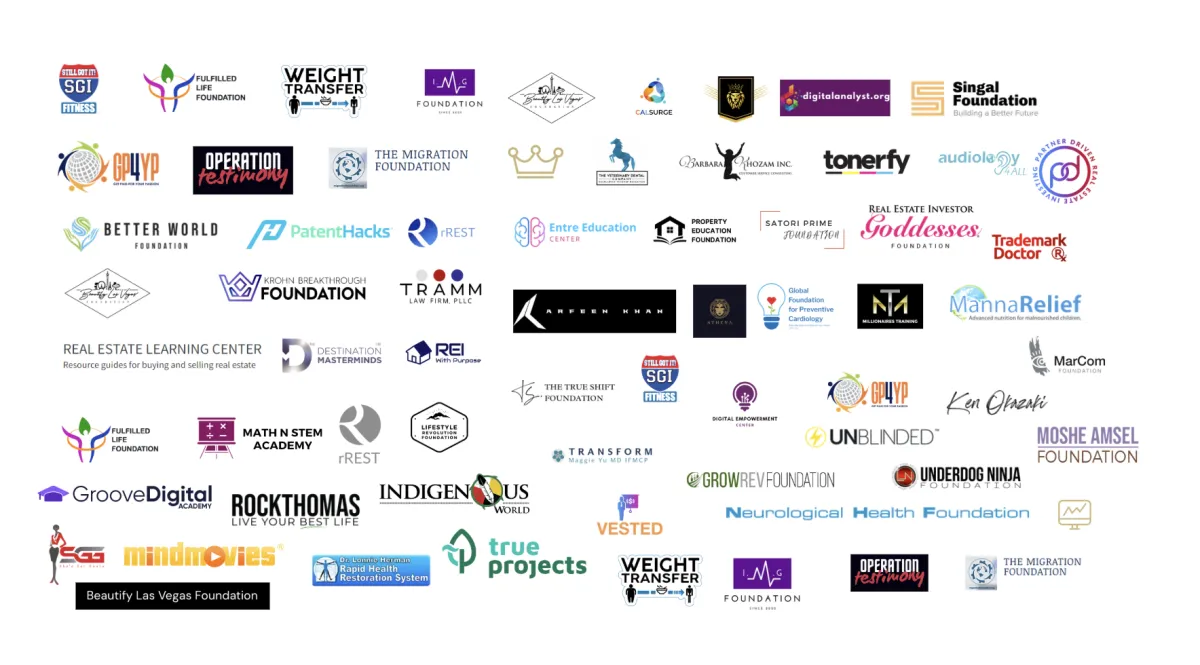
Examples of magazines, publications, and technology companies created and commercialized

Examples of inventors, entrepreneurs, investors, business owners, experts, and thought leaders from 100+ industries

Strategies featured across

Press Play To Watch The Videos
TEDx Talk on Strategic Philanthropy Leveraging Public Nonprofits
Strategic Philanthropy Through Private Foundations
The Strategic Advantages of Integrating Nonprofits & Foundations
Integrating a nonprofit or private foundation isn’t about charity - it’s about control, efficiency, and leverage.
Here’s what it unlocks:
Estate Reduction Tool
Shrink your taxable estate by donating assets into structures you influence.Asset Protection Layer
Move IP, assets, and capital out of exposed entities and into protected vehicles.Risk Reduction Strategy
Reduce personal and business risk by removing assets from your personal balance sheet.Lifetime Income Tax Reduction
Lower income taxes year after year — not just once.5-Year Deduction Carryforwards
Unused deductions don’t disappear — they roll forward.Capital Gains & Depreciation Recapture Relief
Donate appreciated assets and reduce capital gains and recapture taxes.Probate Cost Elimination
Assets donated don’t go through probate — no courts, delays, or public exposure.Capital & Grant Access
Unlock funding sources unavailable to individuals or for-profit businesses.Reputation & Credibility Lift
Build goodwill, authority, and trust while advancing real missions.Flexible Contribution Model
Contribute time, talent, capital, IP, and expertise — not just cash.Gift Tax Workarounds
Bypass the rigid limits of wills, revocable trusts, and traditional gifting strategies.
Why the Wealthiest Families Do This
There’s a reason the world’s most powerful families hold, control, and manage wealth through nonprofits and foundations — especially in the U.S.
They’re not giving wealth away.
They’re repositioning it.
A Parallel Legal & Tax System - Hidden in Plain Sight
This isn’t a loophole.
It’s an entirely separate business, legal, tax, and estate system - one most entrepreneurs and investors are never shown.
When done strategically:
It doesn’t cost you.
It doesn’t weaken your business.
It doesn’t reduce your control.
It's the exact opposite:
It reduces several layers of taxes
It elevates the reputation of your business
It enhances control of income, assets, and IP
The Reality: Most Advisors Don't Cover This
Most legal, tax, finance, and insurance advisors are focused on implementing their unique solution to your overall wealth generation and preservation plans.
While you are alive:
The business lawyer focuses on business structuring.
The estate lawyers focuses on estate documents
The IP lawyer focuses on IP filings and registration
The accountant focuses on filing and reporting old data
The financial advisor focuses on AUM and ignores everything all other "finances"
The insurance agent specializes in policies and won't touch anything else
The realtor focuses on getting the property bought or sold and their commission
After your death:
Finally - the probate lawyer, if required, is hired to piece together all the above transactions - while trying to deal with probate judges, lawyers, creditors, the tax man, and the banks, financial institutions, realtors, accountants, and auctioneers at the same time.
The statistics show that upwards of 80% of all "deaths" end in probate court, despite having various estate and succession documents - that statistic should not surprise you - especially if NONE of the advisors have ever coordinated and aligned their strategies.
What We Do
We focus on the "big picture" and connect the independent pieces of the puzzle to spot and fix the leaks, gaps, and traps that can dilute and destroy your wealth, wisdom, and values. Those are the gaps that philanthropic business and estate planning is designed to fix.
We help entrepreneurs and investors integrate nonprofits and foundations as strategic tools for:
Business growth
Estate protection
Investment strategy
Tax optimization
Legacy creation
Not someday.
Now.
This isn’t philanthropy as sacrifice.
It’s philanthropy as strategy.
The Role Of Public Nonprofits & Private Foundations
One is structured to receive and deploy fuel to educate, innovate, and transact with the public.
The other is structured to convert excess income & assets into impact investments, grants, and donations.
Structured together - these entities complete the puzzle.
Public nonprofit:
Active model
Operate a public nonprofit like a business:
Offer goods and services like a business (certain limits exist)
Secure grants from corporations, individuals, and government agencies
Board members are family and independent parties
Offer programs and services
Receive grants & donations
Get compensation for your work
Operate as a stand-alone company or in alignment with your business ventures
Stand out as an educator, speaker, innovator, early tech adopter, and impact investor empowering society
Passive foundation:
Passive model
Operate a private foundation like a charitable investment fund:
Invests in a diverse range of assets - real estate, stock, shares, crypto, etc.
Funded by one family or a corporation
Multiple family members can donate to one foundation
Assets are removed from the estate and bypass probate
Family controls all decisions - no independent board required
Kids and grandkids take board seats, generation after gen.
Reasonable compensation for investment and charity allowed
Integrates with businesses, wills, trusts, and tax strategies
Both Together:
Your Wildcard
Think of your nonprofit entities as the ultimate "wildcard" that you and your family have at your disposal:
Reduce 30-50% of taxable income every single year
Break the 1031-exchange cycle and beat capital gains and recaptured depreciation on exits
Control the donated funds and reinvest them into diverse assets - in a tax-free setting
Convert "taxable dollars" into "donations and grants"
Preserve wealth for generations to come and prevent heirs or even ex-spouses from diluting your wealth
BECOME A PHILANTHROPIST™
Get An In-depth Evaluation Covering Business, Estate, Tax, and Investment Strategies Under An Alternate Set of Lenses - As A Philanthropist and Impact Investor.
Fill out the assessment form below >>
Schedule A Complimentary "Philanthropic" Call

© 2024 Become A Philanthropist™, Philanthropic Estate Planning™ copyrighted intellectual property of Become A Philanthropist LLC. All rights reserved. No legal, tax, financial, or compliance advice provided. All information and content on this site is intended for educational and entertainment purposes only. No attorney-client relationship formed by contacting us or filling out a form or scheduling a call with our team.